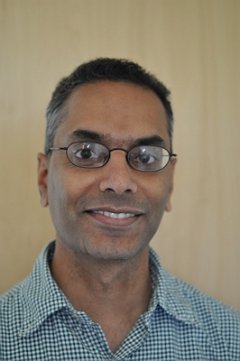Taming Uncertainty, Scale, and Change: A Programming Language Perspective
The modern-day software ecosystem is a messy and chaotic one. Among other things, it includes an intricate stack of sophisticated services and components, susceptible to frequent (and often incompatible) upgrades and patches; emerging applications that operate over large, unstructured, and noisy data; and, an ever growing code base replete with latent defects and redundancies. Devising novel techniques to tame this complexity, and improve software resilience, trustworthiness, and expressivity in the process, is a common theme actively being explored by several ongoing DARPA programs.
This talk gives an overview of three such efforts - PPAML (Probabilistic Programming Advancing Machine Learning), MUSE (Mining and Understanding Software Enclaves), and BRASS (Building Resource Adaptive Software Systems).
These programs have seemingly disparate goals - PPAML seeks to democratize machine learning through the use of probabilistic programming abstractions; MUSE aims to exploit predictive analytics over large software corpora to repair and synthesize programs; and, BRASS is concerned with devising self-adaptive software capable of automatically responding to changes in its operating environment.
Despite their outward differences, however, all three programs nonetheless critically rely on common foundational advances in programming language design, analysis, and implementation to realize their vision, and share an overarching goal to revolutionize the way we think about software construction and reliability.
Track: ECOOP Summer School
Dr. Suresh Jagannathan joined DARPA in September 2013. His research interests include programming languages, compilers, program verification, and concurrent and distributed systems. Prior to joining DARPA, Dr. Jagannathan was a professor of computer science at Purdue University. He has also served as visiting faculty at Cambridge University, where he spent a sabbatical year in 2010; and as a senior research scientist at the NEC Research Institute in Princeton, N.J. Dr. Jagannathan has published more than 125 peer-reviewed conference and journal publications and has co-authored one textbook. He holds three patents. He serves on numerous program and steering committees, and is on the editorial boards of several journals. Dr. Jagannathan holds Doctor of Philosophy and Master of Science degrees in Electrical Engineering and Computer Science from the Massachusetts Institute of Technology. He earned a Bachelor of Science degree in Computer Science from the State University of New York, Stony Brook.
Fri 10 JulDisplayed time zone: Amsterdam, Berlin, Bern, Rome, Stockholm, Vienna change
10:30 - 12:00 | |||
10:30 90mTalk | Taming Uncertainty, Scale, and Change: A Programming Language Perspective Summer School | ||
